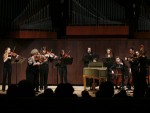Title
This month, conductor William Christie and members of the ensemble Les Arts Florissants will be returning to Juilliard for their third annual residency and performance project. For the first time, though, Christie and his colleagues will be working with students in the School’s new Historical Performance program. As a result, the residency will be more intense and rigorous for the students involved. During the week before the concert, which will take place on April 2 in Alice Tully Hall, students will have the opportunity to take lessons with members of Les Arts Florissants, the Baroque orchestra that Christie founded more than 30 years ago with the motto “Le Baroque Retrouvé,” or “The Baroque Rediscovered.” Concurrently, Christie will be rehearsing with the Juilliard415 Ensemble, the Historical Performance student orchestra.
Body
Benjamin Sosland, Historical Performance’s administrative director, has been deeply involved in that program’s development over the last few years. He calls Christie the godfather figure of the department and, in a recent interview, said that Christie’s involvement “set this program apart.” Sosland noted that with the Historical Performance majors, Christie will be able to address more complex and involved historical and interpretational issues than in previous years. Students will also benefit from access to what faculty member Kenneth Weiss calls Christie’s “exciting performances that speak very well today” with “an immediacy of interpretation.”
The April 2 program was selected by Christie along with Weiss, who teaches harpsichord at Juilliard and is a frequent Christie collaborator. The repertoire was chosen specifically to highlight the talents and interests of both Christie and the members of Historical Performance. Weiss also wished to mix well-known composers of the Baroque, such as Purcell and Handel, alongside lesser-known composers such as Charles Avison and Thomas Arne, whose music, Weiss believes, deserves to be rediscovered.
Christie is well known for his catalog of opera performances with Les Arts Florissants, so the upcoming concert will include suites from operas by Locke, Purcell, and Arne, selected to employ what Weiss calls Christie’s “fantastic theatrical sense.” Of particular interest will be the iconic “Frost” scene from Purcell’s King Arthur, in which the Cold Genius, a wizard with a shiveringly cold bass voice, is awoken by Cupid and rises up from the ice.
A portion of the concert, which serves as the annual Jerome L. Greene Concert of Baroque music, will also be devoted to showcasing Juilliard’s new continuo organ. The instrument, built by the Deblieck Organ Company in Belgium, was commissioned for the School and will be used by both the Historical Performance program and other departments. It was designed with great versatility in mind and can accommodate pitches ranging from A=392 to A=466. Several pieces by Handel, including the first of the Opus 4 organ concertos, will be performed on the instrument.
In addition to the instrumental works, arias and motets by Handel and Purcell will be presented by students of the Vocal Arts Department who have worked with Weiss. Christie is a great supporter of young vocal talent, having founded Le Jardin des Voix—a program dedicated to the training of new talent in Baroque vocal repertoire—and Weiss calls him “especially generous and patient” with his students.
During their stay in New York, Christie and members of Les Arts Florissants will be involved in an opera festival at the Brooklyn Academy of Music. Curated by Christie, this festival commemorates the 30th anniversary of the founding of Les Arts Florissants and will focus on music of the English Baroque, including Purcell’s Dido and Aeneas and The Fairy Queen.
Christie’s residency at Juilliard continues to be an annual highlight of the Historical Performance program, but it is far from isolated. In the program’s first year, the School has welcomed a myriad of European historical performance specialists, including Christie, Nicholas McGegan, Emma Kirkby, Fabio Biondi, and Jordi Savall, as well as distinguished scholars, performers, and dancers from the United States. Sosland noted that this all represents a gradual acceleration of the Historical Performance calendar and that one can expect even more performances, residencies, clinics, and master classes next year.





